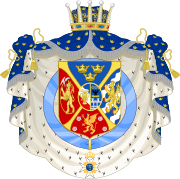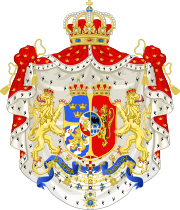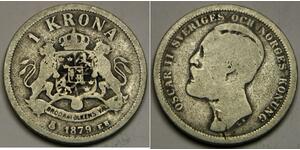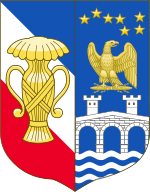| This article needs additional citations for verification. (May 2014) |
| Oscar II | |||||
|---|---|---|---|---|---|
 |
|||||
| King of Sweden | |||||
| Reign | 18 September 1872 – 8 December 1907 | ||||
| Coronation | 12 May 1873 | ||||
| Predecessor | Charles XV | ||||
| Successor | Gustaf V | ||||
| King of Norway | |||||
| Reign | 18 September 1872 – 7 June 1905 | ||||
| Coronation | 18 July 1873 | ||||
| Predecessor | Charles IV | ||||
| Successor | Haakon VII | ||||
| Spouse | Sofia of Nassau | ||||
| Issue | Gustaf V of Sweden Prince Oscar Bernadotte Prince Carl, Duke of Västergötland Prince Eugén, Duke of Närke |
||||
|
|||||
| House | House of Bernadotte | ||||
| Father | Oscar I of Sweden | ||||
| Mother | Josephine of Leuchtenberg | ||||
| Born | 21 January 1829 Stockholm Palace, Stockholm |
||||
| Died | 8 December 1907 (aged 78) Stockholm Palace, Stockholm |
||||
| Burial | Riddarholmskyrkan, Stockholm | ||||
| Religion | Lutheran | ||||
| Signature | |||||
Oscar II (21 January 1829 – 8 December 1907), baptised Oscar Fredrik,[1] was King of Sweden from 1872 until his death and King of Norway from 1872 until 1905. The third son of King Oscar I of Sweden and Josephine of Leuchtenberg, he was a descendant of Gustav I of Sweden through his mother.
Contents
Early life[edit]
At his birth in Stockholm, Oscar Fredrik was created Duke of Östergötland. He entered the navy at the age of eleven, and was appointed junior lieutenant in July 1845. Later he studied at Uppsala University, where he distinguished himself in mathematics. On 13 December 1848, he was made an honorary member of the Royal Swedish Academy of Sciences.
On 6 June 1857 he married in Wiesbaden-Biebrich, Germany, Princess Sophia Wilhelmina, youngest daughter of Duke William of Nassau.
From 1859, when his father died, he was first in line to the Swedish throne after his oldest brother King Charles, who then had no male heirs (his son had died in infancy in 1854). His middle brother Gustaf had died in 1852.
King of Sweden and Norway[edit]
He succeeded his brother Charles XV / IV on 18 September 1872, and was crowned as king of Norway in the Nidaros Cathedral in Trondheim on 18 July 1873. At the accession he adopted as his motto Brödrafolkens väl / Broderfolkenes Vel ("The Welfare of the Brother Peoples"). While the King and the Royal Court resided mostly in Sweden, Oscar made the effort of learning to be fluent in Norwegian and from the very beginning he realized the essential difficulties in the maintenance of the union between the two countries.
The political events which led up to the peaceful dissolution of the union between Norway and Sweden in 1905 could hardly have been attained but for the tact and patience of the king himself. He was dethroned on 7 June 1905 by the Norwegian Parliament and renounced the Norwegian throne on 26 October. He declined, indeed, to permit any prince of his house to become king of Norway, but better relations between the two countries were restored before his death, which occurred in Stockholm on 8 December 1907.
Foreign and domestic statecraft[edit]
His acute intelligence and his aloofness from the dynastic considerations affecting most European sovereigns gave the king considerable weight as an arbitrator in international questions. At the request of Great Britain, Germany and the United States in 1889 he appointed the chief justice of Samoa, and he was again called on to arbitrate in Samoan affairs in 1899.
In 1897 he was empowered to appoint a fifth arbitrator if necessary in the Venezuelan dispute, and he was called on to act as umpire in the Anglo-American arbitration treaty that was quashed by the United States Senate. He won many friends in the United Kingdom by his outspoken and generous support of Britain at the time of the Second Boer War (1899–1902), expressed in a declaration printed in The Times of 2 May 1900, when continental opinion was almost universally hostile.[2]
He was the 1,027th Knight of the Order of the Golden Fleece in Spain and the 774th Knight of the Order of the Garter in 1881.
During his time as King, the Office of Prime Minister was instituted in 1876. Louis De Geer became the first head of government in Sweden with this title. The most known and powerful first minister of the Crown during the reign of Oscar was the conservative estate-owner Erik Gustaf Boström . He served as Prime Minister between 1891 -1900 and from 1902 to 1905. He became during this time, very trusted by Oscar, who had much difficulty approving of some one else as Prime Minister. Gradually, Boström was given free hands by Oscar to select his own ministers without much regal involvement. It was an arrangement ( unintentionally by both the King and Boström ) that furthered the road to parliamentarism.
Science and arts[edit]

King Oscar II in full
regalia – he was the last crowned Swedish king and was known to enjoy the pomp and ceremony.
|

Portrait of Oscar II by
Anders Zorn 1898
|
Himself a distinguished writer and musical amateur, King Oscar proved a generous friend of learning, and did much to encourage the development of education throughout his dominions. In 1858 a collection of his lyrical and narrative poems, Memorials of the Swedish Fleet, published anonymously, obtained the second prize of the Swedish Academy. His "Contributions to the Military History of Sweden in the Years 1711, 1712, 1713," originally appeared in the Annals of the Academy, and were printed separately in 1865. His works, which included his speeches, translations of Herder's Cid and Goethe's Torquato Tasso, and a play, Castle Cronberg, were collected in two volumes in 1875–76, and a larger edition, in three volumes, appeared in 1885–88.
His Easter hymn and some other of his poems are familiar throughout the Scandinavian countries. His Memoirs of Charles XII of Sweden were translated into English in 1879. In 1881 he founded the World's first open-air museum at his summer residence near Christiania, now Oslo. In 1885 he published his Address to the Academy of Music, and a translation of one of his essays on music appeared in Literature in May 1900. He had a valuable collection of printed and manuscript music, which was readily accessible to the historical student of music.
Being a theater lover, he commissioned a new opera house to be built by Axel Anderberg for the Royal Swedish Opera which was inaugurated on 19 September 1898. It is until today the current home of that institution. Oscar II told Henrik Ibsen that his Ghosts was "not a good play". As he was dying, he requested that the theatres not be closed on account of his death. His wishes were respected.
King Oscar II was an enthusiast of Arctic exploration. Along with Swedish millionaire Oscar Dickson and Russian magnate Aleksandr Mikhaylovich Sibiryakov, he was the patron of a number of pioneering Arctic expeditions in the 1800s. Among the ventures the king sponsored, the most important are Adolf Erik Nordenskiöld's explorations to the Russian Arctic and Greenland, as well as Fridtjof Nansen's Polar journey on the Fram.[3]
The name and portrait of Oscar II have been used as a trademark for King Oscar sardines (which remains the only brand to obtain his "royal permission") as well as for gingerbread cookies (pepparkakor) and other bakery products made by Göteborgs Kex AB.
Children[edit]
King Oscar II was married to Sophia of Nassau. Their children were:
- 1. King Gustaf V (1858–1950)
- 2. Prince Oscar, Duke of Gotland, later Count Oscar Bernadotte af Wisborg (1859–1953)
- 3. Prince Carl, Duke of Västergötland (1861–1951)
- 4. Prince Eugén, Duke of Närke (1865–1947)
Oscar also is alleged to have had several extramarital children, among them:
Oscar II (unlike his father) never officially recognized any illegitimate children of his. He is also alleged to have had two sons with the actress Marie Friberg,[5] Nils and August Ekstam (the latter born 1878).[6]
His eldest son, Oscar Gustaf Adolf, duke of Värmland, succeeded him as King Gustaf V of Sweden. His second son, Oscar, resigned his royal rights on his marriage in 1888 with a lady-in-waiting, Miss Ebba Munck, when he assumed the title of Prince Bernadotte and from 1892 he was known as Count Wisborg. The king's other sons were Charles, duke of Västergötland, who married Princess Ingeborg of Denmark; and Eugén, duke of Närke, well known as an artist.
As King of Norway, he was, after the events of 1905, succeeded by his grandnephew Prince Carl of Denmark, grandson of his late elder brother King Charles, who ascended the Norwegian throne in 1905 with reign name Haakon VII.
Harald V of Norway, the great-grandson of Oscar II (grandson of his third son duke of Västergötland), succeeded in 1991 to the throne of Norway once held by his great-grandfather, Oscar II.
Ancestry[edit]
|
|
|
|
|
|
|
|
|
|
|
|
|
|
|
|
|
|
|
|
16. Jean Bernadotte | |||||||||||||||
|
|
||||||||||||||||
|
|
|
|
|
|
||||||||||||
|
|
8. Jean Henri Bernadotte |
|
||||||||||||||
|
|
||||||||||||||||
|
|
|
|
|
|
|
|
|
|||||||||
|
|
17. Marie du Pucheu | |||||||||||||||
|
|
||||||||||||||||
|
|
|
|
|
|
||||||||||||
|
|
4. Charles XIV John of Sweden |
|
||||||||||||||
|
|
||||||||||||||||
|
|
|
|
|
|
|
|
|
|
|
|
||||||
|
|
18. Jean de Saint Vincent | |||||||||||||||
|
|
||||||||||||||||
|
|
|
|
|
|
||||||||||||
|
|
9. Jeanne de Saint Vincent |
|
||||||||||||||
|
|
||||||||||||||||
|
|
|
|
|
|
|
|
|
|||||||||
|
|
19. Marie d'Abbadie de Sireix | |||||||||||||||
|
|
||||||||||||||||
|
|
|
|
|
|
||||||||||||
|
|
2. Oscar I of Sweden |
|
||||||||||||||
|
|
||||||||||||||||
|
|
|
|
|
|
|
|
|
|
|
|
|
|
|
|||
|
|
20. Joseph Clary | |||||||||||||||
|
|
||||||||||||||||
|
|
|
|
|
|
||||||||||||
|
|
10. François Clary |
|
||||||||||||||
|
|
||||||||||||||||
|
|
|
|
|
|
|
|
|
|||||||||
|
|
21. Françoise Agnes Ammoric | |||||||||||||||
|
|
||||||||||||||||
|
|
|
|
|
|
||||||||||||
|
|
5. Désirée Clary |
|
||||||||||||||
|
|
||||||||||||||||
|
|
|
|
|
|
|
|
|
|
|
|
||||||
|
|
22. Joseph Ignace Somis | |||||||||||||||
|
|
||||||||||||||||
|
|
|
|
|
|
||||||||||||
|
|
11. Françoise Rose Somis |
|
||||||||||||||
|
|
||||||||||||||||
|
|
|
|
|
|
|
|
|
|||||||||
|
|
23. Catherine Rose Soucheiron | |||||||||||||||
|
|
||||||||||||||||
|
|
|
|
|
|
||||||||||||
|
|
1. Oscar II of Sweden |
|
||||||||||||||
|
|
||||||||||||||||
|
|
|
|
|
|
|
|
|
|
|
|
|
|
|
|
|
|
|
|
24. François de Beauharnais, Marquess de la La Ferté-Beauharnais | |||||||||||||||
|
|
||||||||||||||||
|
|
|
|
|
|
||||||||||||
|
|
12. Alexandre, vicomte de Beauharnais |
|
||||||||||||||
|
|
||||||||||||||||
|
|
|
|
|
|
|
|
|
|||||||||
|
|
25. Marie Anne Henriette Françoise Pyvart de Chastulle | |||||||||||||||
|
|
||||||||||||||||
|
|
|
|
|
|
||||||||||||
|
|
6. Eugène de Beauharnais |
|
||||||||||||||
|
|
||||||||||||||||
|
|
|
|
|
|
|
|
|
|
|
|
||||||
|
|
26. Joseph-Gaspard de Tascher de La Pagerie | |||||||||||||||
|
|
||||||||||||||||
|
|
|
|
|
|
||||||||||||
|
|
13. Joséphine de Tascher de La Pagerie |
|
||||||||||||||
|
|
||||||||||||||||
|
|
|
|
|
|
|
|
|
|||||||||
|
|
27. Rose-Claire des Vergers de Sanois | |||||||||||||||
|
|
||||||||||||||||
|
|
|
|
|
|
||||||||||||
|
|
3. Duchess Josephine of Leuchtenberg |
|
||||||||||||||
|
|
||||||||||||||||
|
|
|
|
|
|
|
|
|
|
|
|
|
|
|
|||
|
|
28. Count Palatine Frederick Michael of Zweibrücken | |||||||||||||||
|
|
||||||||||||||||
|
|
|
|
|
|
||||||||||||
|
|
14. Maximilian I Joseph of Bavaria |
|
||||||||||||||
|
|
||||||||||||||||
|
|
|
|
|
|
|
|
|
|||||||||
|
|
29. Countess Palatine Maria Franziska of Sulzbach | |||||||||||||||
|
|
||||||||||||||||
|
|
|
|
|
|
||||||||||||
|
|
7. Princess Augusta of Bavaria |
|
||||||||||||||
|
|
||||||||||||||||
|
|
|
|
|
|
|
|
|
|
|
|
||||||
|
|
30. Prince Georg Wilhelm of Hesse-Darmstadt | |||||||||||||||
|
|
||||||||||||||||
|
|
|
|
|
|
||||||||||||
|
|
15. Princess Augusta Wilhelmine of Hesse-Darmstadt |
|
||||||||||||||
|
|
||||||||||||||||
|
|
|
|
|
|
|
|
|
|||||||||
|
|
31. Countess Maria Louise Albertine of Leiningen-Falkenburg-Dagsburg | |||||||||||||||
|
|
||||||||||||||||
|
|
|
|
|
|
||||||||||||
Arms[edit]

|

|

|

|

|
References[edit]
| Wikimedia Commons has media related to Oscar II of Sweden. |
- ^ Stockholm City Archives, archive of the Court parish, birth and baptism records, volume C I:5
- ^ Chisholm, Hugh (1911). The Encyclopædia britannica 11th ed. p. 346.
- ^ Aho, Maire (January 1999), "AE Nordenskiöld Collection included in the Unesco Memory of the World Program", Tietolinja News, FI: Helsinki.
- ^ Anna Hofmann – varietéstjärna och filmregissör, catalogue of exhibition by that name at Stockholms Stadsmuséum 1998 with essays by Åke Abrahamsson and Marika Lagercrantz/Lotte Wellton.
- ^ Sherlock Holmes and the King of Scandinavia The Swedish Pathological Society
- ^ Var är den försvunne kungasonen August? Aftonbladet 24 May 2010
 This article incorporates text from a publication now in the public domain: Chisholm, Hugh, ed. (1911). "Oscar II.". Encyclopædia Britannica (11th ed.). Cambridge University Press.
This article incorporates text from a publication now in the public domain: Chisholm, Hugh, ed. (1911). "Oscar II.". Encyclopædia Britannica (11th ed.). Cambridge University Press.
Further reading[edit]
- Cronholm, Neander N. (1902). A History of Sweden from the Earliest Times to the Present Day. ch 42 pp 301–10.
External links[edit]
- The Royal Norwegian Order of St Olav – H.M. King Oscar II the former Grand Master of the Order[dead link]
|
Oscar II
Born: 21 January 1829 Died: 8 December 1907 |
||
| Regnal titles | ||
|---|---|---|
| Preceded by Charles XV/IV |
King of Sweden 18 September 1872 – 8 December 1907 |
Succeeded by Gustav V |
| King of Norway 18 September 1872 – 7 June 1905 |
Vacant
Title next held by
Haakon VII |
|
|
||||||||||||||||||||||||||||||||||||||||||||||||||||||||||||||||||||||
|
||||||||||||||||||||||||||||||||||||
|
||||||||||||||||||||||||||||||||||||||||||||||||||||||||||||||||||
- People from Stockholm
- Protestant monarchs
- House of Bernadotte
- Swedish monarchs
- Swedish Lutherans
- Norwegian monarchs
- Swedish people of French descent
- Knights of the Garter
- Knights of the Golden Fleece
- Knights of the Order of the Norwegian Lion
- Uppsala University alumni
- Members of the Royal Swedish Academy of Sciences
- Swedish monarchs of German descent
- 1829 births
- 1907 deaths
- Burials at Riddarholmen Church
- Knights of the Supreme Order of the Most Holy Annunciation
- Knights Grand Cross of the Military William Order
- Swedish Freemasons
- 19th-century monarchs in Europe
- Dukes of Östergötland
- Knights of the Royal Order of the Seraphim










